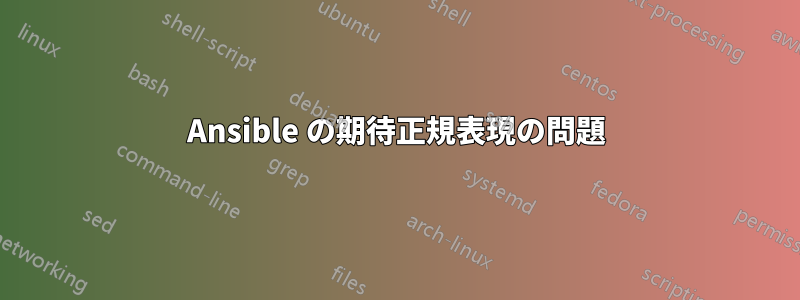
私は Ansible の初心者です。Ansible で expect を使用してパッケージのインストールを自動化しようとしていました (以下の例では、アンインストール)。lynx パッケージを手動でアンインストールしているときに、次のプロンプトが表示されます。expect 応答フィールドで、このパターン (両方の行) に一致させようとしましたが、スクリプトが失敗しました。1 行では機能しますが、Is this ok [y/N]: y。両方の行で使用した正規表現は、Installed size: 5.4 M\nIs this ok [y/N]: y です。
-----------------------
Installed size: 5.4 M
Is this ok [y/N]:
----------------------
コード 1 (両方の行のパターン一致 - 失敗):
[ansible@localhost ansible]$ cat main.yml
---
- hosts: localhost
remote_user: ansible
become: yes
become_method: sudo
connection: ssh
gather_facts: yes
tasks:
- name: remove a package
expect:
command: yum remove lynx
responses:
Installed size: 5.4 M\nIs this ok \[y\/N\]: y
#Is this ok \[y\/N\]: y
echo: yes
出力:
[ansible@localhost ansible]$ ansible-playbook main.yml
[DEPRECATION WARNING]: DEFAULT_SUDO_USER option, In favor of become which is a generic framework . This feature will be removed in version 2.8. Deprecation
warnings can be disabled by setting deprecation_warnings=False in ansible.cfg.
ERROR! Syntax Error while loading YAML.
The error appears to have been in '/etc/ansible/main.yml': line 13, column 51, but may
be elsewhere in the file depending on the exact syntax problem.
The offending line appears to be:
responses:
Installed size: 5.4 M\nIs this ok \[y\/N\]: y
^ here
exception type: <class 'yaml.scanner.ScannerError'>
exception: mapping values are not allowed in this context
in "<unicode string>", line 13, column 51
[ansible@localhost ansible]$
================================================================================ コード 2 (1 行のパターン マッチ - 正常に動作):
[ansible@localhost ansible]$ cat main.yml
---
- hosts: localhost
remote_user: ansible
become: yes
become_method: sudo
connection: ssh
gather_facts: yes
tasks:
- name: remove a package
expect:
command: yum remove lynx
responses:
#Installed size: 5.4 M\nIs this ok \[y\/N\]: y
Is this ok \[y\/N\]: y
echo: yes
出力
[ansible@localhost ansible]$
[ansible@localhost ansible]$ ansible-playbook main.yml
[DEPRECATION WARNING]: DEFAULT_SUDO_USER option, In favor of become which is a generic framework . This feature will be removed in version 2.8. Deprecation
warnings can be disabled by setting deprecation_warnings=False in ansible.cfg.
PLAY [localhost] *********************************************************************************************************************************************
TASK [Gathering Facts] ***************************************************************************************************************************************
ok: [127.0.0.1]
TASK [remove a package] **************************************************************************************************************************************
changed: [127.0.0.1]
PLAY RECAP ***************************************************************************************************************************************************
127.0.0.1 : ok=2 changed=1 unreachable=0 failed=0
答え1
使用する方が良いでしょうyumモジュール。
---
- hosts: localhost
remote_user: ansible
become: yes
become_method: sudo
connection: ssh
gather_facts: yes
tasks:
- yum:
name: lynx
state: absent
またはパッケージ
---
- hosts: localhost
remote_user: ansible
become: yes
become_method: sudo
connection: ssh
gather_facts: yes
tasks:
- pacakge:
name: lynx
state: absent
可能な場合は、コマンド/シェルよりも常にモジュールを使用する必要があります。モジュールを使用すると、シェル/コマンドに大量のロジックを追加しなくても、エラー チェックとべき等性が実現します。
答え2
皆さんの提案に感謝します。はい、YUM を使用します。とにかく、以下の正規表現で問題は解決しました。
Installed.*\nIs this ok \[y\/N\]: y
Code:
---
- hosts: localhost
remote_user: ansible
become: yes
become_method: sudo
connection: ssh
gather_facts: yes
tasks:
- name: remove a package
expect:
command: yum remove lynx
responses:
Installed.*\nIs this ok \[y\/N\]: y
# Is this ok \[y\/N\]: y
echo: yes


